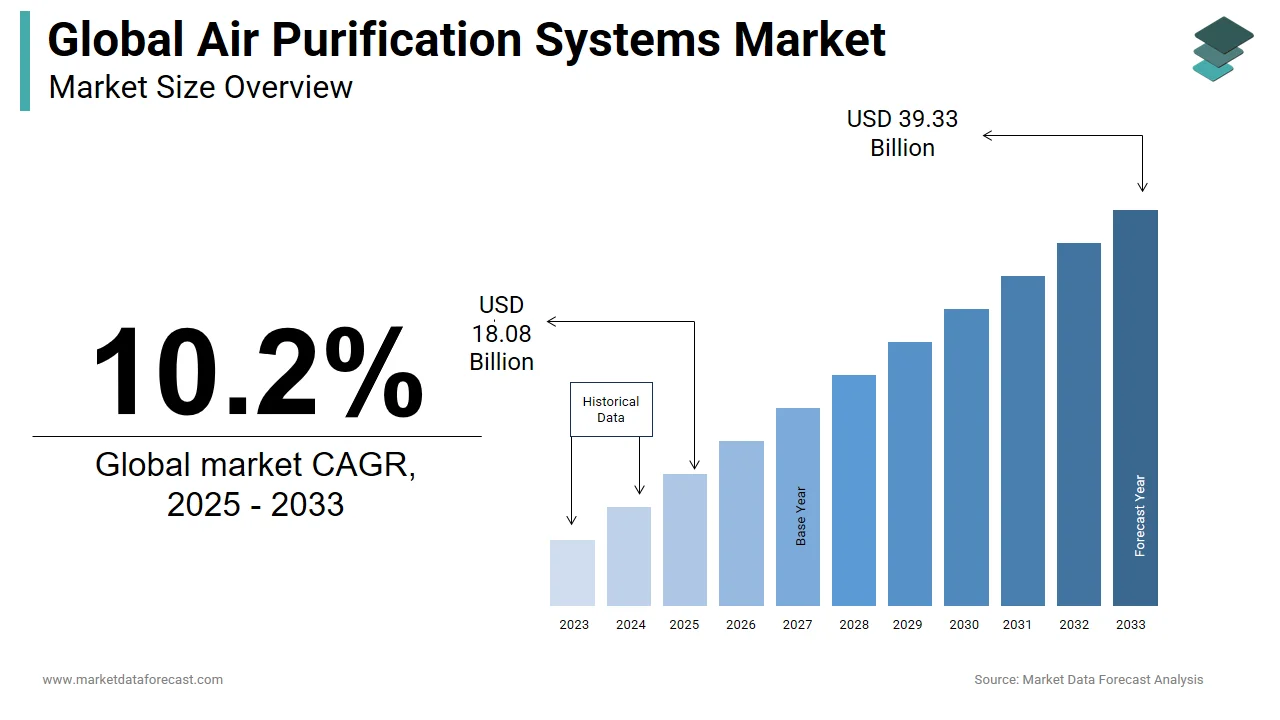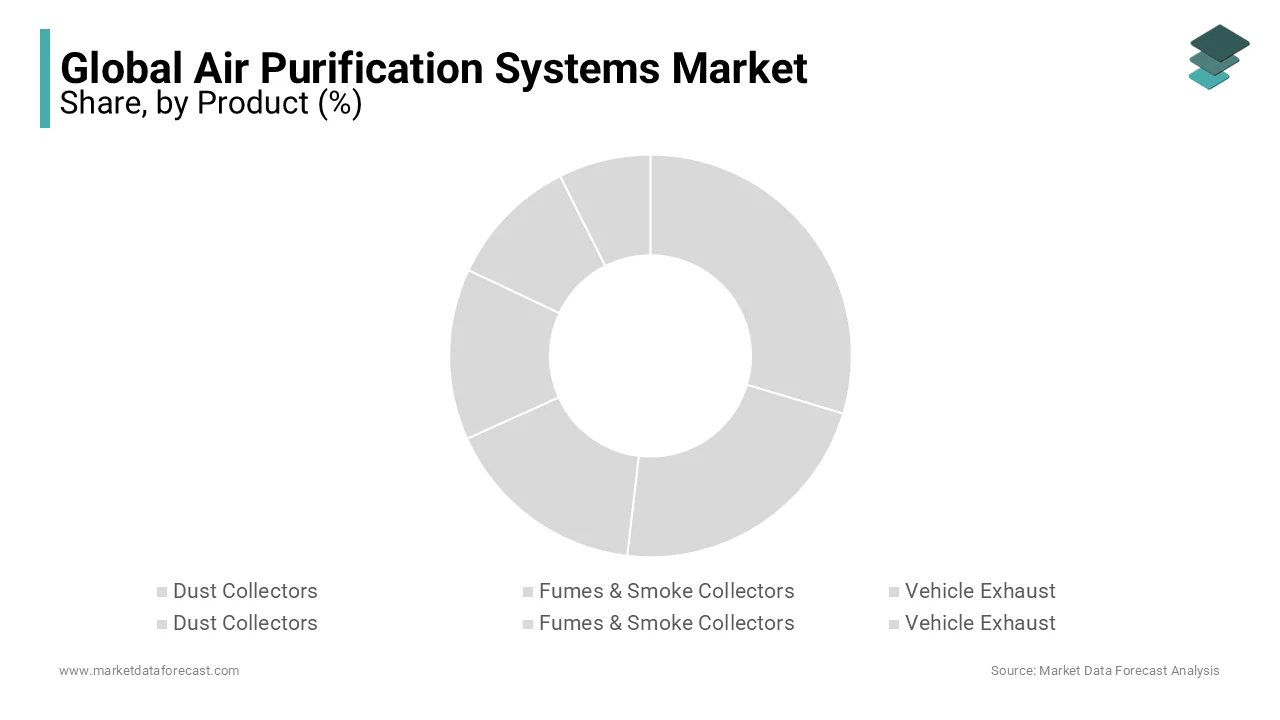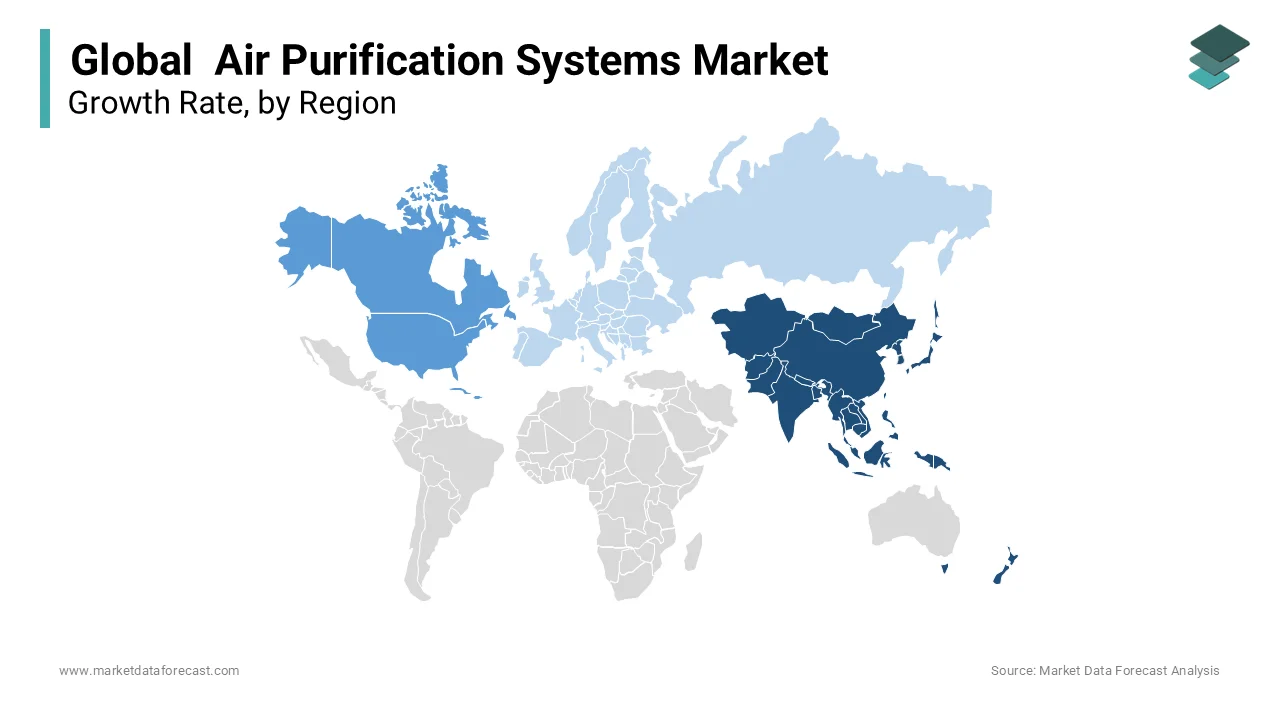Global Air Purification Systems Market Size, Share, Trends, Growth Forecast Report – Segmented by Product (Dust Collectors, Fumes & Smoke Collectors, Vehicle Exhaust, Others), Technology (HEPA, ESP, Activated Carbon, Iconic Filters, Others), End-user sector (Automotive, Construction, Healthcare, Energy & Utilities, Manufacturing, Others) & Region - Industry Forecast From 2024 to 2032
Global Air Purification System Market Size (2024 to 2032)
The global air purification system market was worth USD 14.89 billion in 2023. The global market is predicted to reach USD 16.41 billion in 2024 and USD 35.69 billion by 2032, growing at a CAGR of 10.2% during the forecast period.

An air purifier is a device used to remove contamination from the air of a room or a particular space to improve indoor air quality. These devices are beneficial to allergic sufferers and asthmatics and also helpful in reducing second-half tobacco smoke. The air purifier system consists of a filter, motor/fan, and housing. The air purifier circulates the air in a room and captures the particles and gases that are present in the air into the filters. The air purification system helps in relieving symptoms of asthma, eliminates harmful chemicals from the indoor environment, neutralizes unpleasant odors, reduces the chance of airborne diseases, improves sleep, removes harmful radon, eliminates hazardous asbestos particles, and can increase life expectancy. The air purifiers are available for home purposes or for commercial purposes. Commercial air purifiers are manufactured as either small stand-alone units that can be rooted to an air handler unit or an HVAC unit found in medical, industrial, and commercial industries. Air purifiers are also used in industries to remove impurities before processing. Owing to the increased health benefits of using air purifiers, demand for air purifiers is increasing, which in turn propel the growth of the air purification system market in the forecast period.
MARKET DRIVERS
The driving force of the Air Purification System Market is the increasing health problem due to impurities present in the air or air pollution.
Air pollution is considered to be very hazardous to health as the human body cannot detect the level of contamination in the air that they breathe; therefore, the demand for air purifiers is increasing in the market. Due to the increasing number of respiratory diseases in the population, consumers prefer to install indoor air purification systems, which drives the growth of the market. In addition, people are becoming health conscious and the increasing awareness among consumers regarding the diseases caused by air pollution is increasing the demand for global air purification system which further boosts the market growth.
Rapid urbanization and industrialization are causing a lot of air pollution. Industries such as Automotive, Construction, Healthcare, etc., emit harmful gases or chemicals that pollute the environment and cause many harmful health diseases, fueling the demand for air purification systems in the market.
Furthermore, the governments of several nations are imposing stringent regulations regarding harmful emissions in order to reduce air pollution, which is fueling the demand for air purifier systems, which in turn boosts market growth.
The technological advancement and increasing efficiency of air purifiers in removing small dust particles or microbes are increasing the demand for advanced air purifiers, which further boosts the growth of the Air Purification System market.
MARKET RESTRAINTS
The high initial cost and harmful ozone emission caused by some air purifiers are restraining the growth of the Air-Purification System Market.
REPORT COVERAGE
|
REPORT METRIC |
DETAILS |
|
Market Size Available |
2023 to 2032 |
|
Base Year |
2023 |
|
Forecast Period |
2024 to 2032 |
|
CAGR |
10.2% |
|
Segments Covered |
By Product, Technology, End Users, and Region |
|
Various Analyses Covered |
Global, Regional & Country Level Analysis, Segment-Level Analysis, DROC, PESTLE Analysis, Porter’s Five Forces Analysis, Competitive Landscape, Analyst Overview on Investment Opportunities |
|
Regions Covered |
North America, Europe, APAC, Latin America, Middle East & Africa |
|
Market Leaders Profiled |
Honeywell International Inc.,3M Company, Sharp Corporation, Daikin Industries Ltd, Air Products and Chemicals Inc., Clean Teq Holdings Limited, Panasonic Corporation, Alfa Laval AB,PX Corporation, Mann+Hummel GmbH, and Others. |
SEGMENTAL ANALYSIS
Global Air Purification System Market Analysis By Product

Based on Product, the Global Air Purification System Market is segmented into Dust Collectors, Fumes & Smoke Collectors, Vehicle Exhaust, and Others (including air cleaners, industrial UV systems, and commercial kitchen ventilation systems). The Dust collector segment is expected to dominate the market owing to the ability to remove dust particles and other allergic particles from the environment efficiently. Growing awareness towards the air quality among consumer’s which leads to an increase in the demand of dust collectors in order to make environment dust or impurity free.
Global Air Purification System Market Analysis By Technology
Based on Technology, the Global Air Purification System Market is segmented into HEPA, ESP, Activated Carbon, Iconic Filters, and Others. Based on Technology, the Global Air Purification System Market is segmented into Dust Collectors, Fumes & Smoke Collectors, Vehicle Exhaust, and Others. HEPA (High-efficiency Particulate Air) is estimated to hold the largest share of the air purification system market, followed by Activated Carbon and ESP (Electrostatic Precipitator). HEPA is highly efficient in trapping airborne particles such as pollen, dust mites, pet dander, tobacco smoke, etc. Activated carbon filters the carbon surface area and makes it porous, which allows it to trap dust particles easily and effectively. The ESP can handle large volumes of gas, heavy dust loads, and corrosive materials. It is best suited and generally found in public places and further drives the growth of the air purification system market during the forecast period.
Global Air Purification System Market Analysis By End-Users
The Global Air Purification System Market is segmented by end-users into Automotive, Construction, Healthcare, Energy and utilities, Manufacturing, and Others. The automotive segment is projected to have the largest share of the global air purification system market due to rising demand for automobiles across the globe and the rising concern for indoor air quality of automobiles. And also the healthcare and construction sector is also going to become the fastest growing segment due to the widespread use of air purifiers in hospitals, laboratories, etc, where a large numbers of people use to gather, and particularly in hospitals, there may be a chance of spreading diseases through impure air.
REGIONAL ANALYSIS

Asia-Pacific is expected to show the fastest growth rate of the air purification system market during the forecast period. The demand for air purification systems is expected to increase in this region because of developing countries such as India, Singapore, Indonesia, and China; the industrial growth is at its peak. In addition it, Indonesia is set to build more coal-fired plant in Jakarta, which may lead to more air pollution and increase the adoption of air purifiers which further propel the air purifier market growth. The market for air purifier systems is expanding rapidly in South Korea due to surging demand by consumers as the population in this region is very concerned about health. The rapidly increasing urbanization and industrialization in developing nations of this region are fueling the demand for air purification systems.
North America is the largest market for the air purification system owing to the health-conscious population in this region. The population in this region is aware of the diseases caused by air pollution, which is fueling the demand for air purifiers. The United States in this region holds the largest share of the market due to the huge deployment of air purification systems in industries in order to improve the air quality within the premises. The increasing installation of comprehensive ambient air quality monitoring systems, along with the development and implementation of regulatory actions and organizing air quality management programs in order to create awareness among people, is expected to surge the demand for air purifiers in Mexico over the forecast period.
Europe is expected to have a healthy growth rate owing to the stringent government regulations regarding emissions. Therefore, the demand for air purification systems is expected to increase in European industries, further fueling the growth of the air purification system market in the coming years.
KEY PARTICIPANTS GLOBAL AIR PURIFICATION SYSTEM MARKET
Some of the leading companies operating in the Global Air Purification System Market are
- Honeywell International Inc.
- 3M Company
- Sharp Corporation
- Daikin Industries, Ltd.
- Air Products and Chemicals, Inc.
- Clean Teq Holdings Limited
- Panasonic Corporation
- Alfa Laval AB
- PX Corporation
- Mann+Hummel GmbH
RECENT DEVELOPMENTS IN THE GLOBAL AIR PURIFICATION SYSTEM MARKET
- In November 2021, Dyson launched its first purifying humidifying technology, “Dyson Purifier Humidify+Cool and Dyson Purifier Humidify+Cool Formaldehyde,” which senses and destroys potentially harmful formaldehyde.
- In May 2021, Dyson launched an air purifier with sensing technology to destroy potentially dangerous indoor pollutants. It is a solid-state formaldehyde sensing purifier fully sealed with HEPA 13 standard filtration.
DETAILED SEGMENTATION OF THE GLOBAL AIR PURIFICATION SYSTEM MARKET INCLUDED IN THIS REPORT
This research report on the global air purification system market has been segmented and sub-segmented based on the product, technology, end users, and region.
By Product
- Dust Collectors
- Fumes & Smoke Collectors
- Vehicle Exhaust
- Dust Collectors
- Fumes & Smoke Collectors
- Vehicle Exhaust
- Others
By Technology
- HEPA
- ESP
- Activated Carbon
- Iconic Filters
- Others
- UV light air filters
- Ozone generators
By End-Users
- Automotive
- Construction
- Healthcare
- Energy & Utilities
- Manufacturing
- Others
By Region
- North America
- Europe
- Asia-Pacific
- Middle East & Africa
Frequently Asked Questions
What role does technological advancement play in shaping the global air purification systems market?
Technological advancements play a pivotal role in the evolution of the air purification systems market, leading to the development of innovative filtration technologies such as High-Efficiency Particulate Air (HEPA), activated carbon, and UV-C sterilization. Additionally, the integration of IoT and AI-enabled features in modern air purifiers enhances efficiency and user experience.
What are the key challenges hindering the growth of the air purification systems market?
Despite significant growth prospects, challenges such as high initial costs associated with advanced air purifiers, lack of awareness in certain regions, and maintenance requirements pose barriers to market expansion. Additionally, the availability of counterfeit products affects consumer trust and market competitiveness.
What are the emerging trends reshaping the global air purification systems market?
Emerging trends in the air purification systems market include the rising demand for portable and wearable air purifiers, the integration of smart features for remote monitoring and control, and the emphasis on eco-friendly and recyclable filter materials to reduce environmental impact.
What factors contribute to the adoption of air purification systems in the healthcare sector?
In the healthcare sector, factors such as the need for maintaining sterile environments in hospitals and healthcare facilities, preventing cross-contamination, and safeguarding patients and healthcare workers from airborne pathogens drive the adoption of air purification systems.
Related Reports
Access the study in MULTIPLE FORMATS
Purchase options starting from $ 2500
Didn’t find what you’re looking for?
TALK TO OUR ANALYST TEAM
Need something within your budget?
NO WORRIES! WE GOT YOU COVERED!
Call us on: +1 888 702 9696 (U.S Toll Free)
Write to us: [email protected]